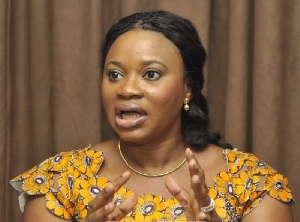 Mrs Charlotte Osei, Electoral Commissioner
Mrs Charlotte Osei, Electoral Commissioner
Ghana’s Electoral Commission (EC) has warned that the current political environment is hostile, a situation which the election management body describes as a recipe for violence in this year’s presidential and parliamentary polls.
This admission is coming barely a month after an international delegation made up of representatives of the National Democratic Institute and the International Republican Institute revealed after an assessment that there is an increasingly polarised political environment and heightened tension ahead of the general elections in December.
Speaking at a colloquium on peaceful elections in Ghana on Wednesday September 7, chairperson of the EC, Mrs Charlotte Osei said the commission has identified some 81 flashpoints in the country prior to the elections and also blamed the media for allowing political communicators to set the agenda every day.
“…In Ghana, the history of six successful elections in the past 24 years should not become the basis for complacency because we seem to have an increasingly volatile political culture. Among the 25 registered political parties that we have in Ghana, we have two strong ones that seem to dominate our political landscape. … We are going into elections where one party believes it must win and the other believes it cannot lose. However, it’s a contest where there is going to be one winner and many losers so in spite of all the preparations and the experience we have, this election is beginning to look like a volatile event if we do not [manage the process better],” she stated.
Mrs Osei added that: “One of the key ways in ensuring peaceful democracy and a stable one is to have a strong independent media and Ghana is voted 26 out of the 180 countries in terms of press freedom. So although we have an independent and free media, the political discourse in the media especially in the local language is very [bad] and we have serial callers and political analysts, who set the agenda every day. Rather than creating the recipe for a stable democracy, even the strength of the media and their accessibility is beginning to create problems for our democratic culture”.